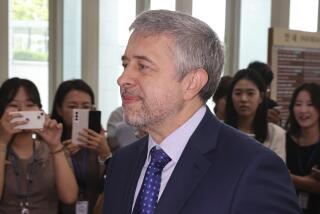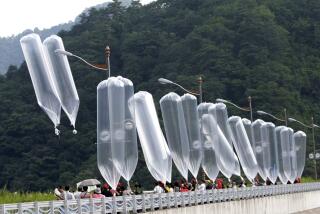SANCTIONS : China May Help U.N. With N. Korea Curbs : Beijing seems ready to go along with Security Council unless nuclear inspections are allowed.
- Share via
SEOUL — In an important development that could help break the standoff over North Korea’s nuclear program, U.S. and South Korean officials believe that China is ready to go along with some form of U.N. sanctions against the Pyongyang regime this fall.
When North Korea first touched off the current crisis in March by threatening to withdraw from the Nuclear Non-Proliferation Treaty, China said it was opposed to sanctions or other collective action by the U.N. Security Council against its neighbor and longtime ally. Because China is a permanent member of the Security Council, it has the power to veto any resolution.
With the threat of sanctions seemingly ruled out, the United States decided to try direct diplomatic negotiations with North Korea, first in June in New York and now in Geneva, where, after seven hours of talks, U.S. and North Korean negotiators indicated Wednesday that progress had been made. The talks resume today.
The U.S. negotiators are trying to persuade North Korea to open up its nuclear facilities to international inspection. And U.S. and South Korean officials say that if the Pyongyang regime of President Kim Il Sung continues to resist, China will support or acquiesce in a U.N. resolution against North Korea.
“If China is convinced that the international community has done its best in diplomatic efforts, we are fairly sure China will not exercise its veto” of a resolution on sanctions, said one senior South Korean official, speaking on condition that he not be identified.
China has been the single most important country in determining what happens to international efforts to stop North Korea’s nuclear program, not only because it has veto power in the Security Council but because, since the demise of the Soviet Union, it is the only major country with any influence over North Korea.
Sources say the United States and its allies have now set an informal deadline of September for North Korea to agree to let in the inspectors from the International Atomic Energy Agency. The IAEA’s board of governors is scheduled to meet in late September to decide what to do about North Korea.
South Korean Foreign Minister Han Sung Joo said in an interview here Wednesday that if the U.S.-North Korean talks do not persuade Pyongyang to change its position on inspections by the time of the IAEA meeting, “then I think the Security Council will have to take action.”
And, he added, if it is clear by then that persuasion and patient diplomacy have failed to turn North Korea around, then “I think we can count on China’s cooperation” at the Security Council.
China might not actually vote for sanctions; it may merely abstain, refusing to exercise its veto power--much as it did in 1990 when the Security Council authorized the use of force against Iraq to remove its troops from Kuwait.
The IAEA has been insisting on its right to make special inspections of two North Korean sites that it believes may be used to store or dispose of materials from a nuclear weapons program. North Korea has been resisting these inspections, saying the sites are military facilities.
CIA Director R. James Woolsey estimated earlier this year that North Korea may already have produced enough material to make at least one nuclear bomb.
China has not publicly announced any easing of its opposition to sanctions. But top American officials have hinted at it, and on the change in allied strategy that would flow from it, during President Clinton’s visit to Asia last week.
The President, in Seoul, said the United States is not planning to get bogged down in “endless discussions” with North Korea. And Secretary of State Warren Christopher told reporters carefully that “I would not want to conclude that . . . China would not cooperate (with sanctions against North Korea) under the right circumstances.”
Christopher is scheduled to meet with Chinese Foreign Minister Qian Qichen at an Asian diplomatic conference in Singapore later this month. Qian also met twice this spring with South Korean Foreign Minister Han.
China has a land border with North Korea that could be used, depending on Beijing’s attitude, either to enforce or to subvert international sanctions. It still provides North Korea with much-needed food, oil, steel and military supplies.
Although China continues to provide supplies and aid to North Korea, relations between the two countries have grown increasingly frosty, particularly since Beijing established diplomatic relations with South Korea two years ago.
A senior South Korean official said he believes China itself wants strongly to stop North Korea from getting nuclear arms.
“I think China has a genuine interest in the denuclearization of the Korean Peninsula,” this official said. “And China has told us this at very high levels several times.”
Kim Jong Il, the son and designated successor to North Korean President Kim, recently tried but failed to arrange a trip to China.
On two or three other occasions, when North Korean Foreign Minister Kim Young Nam made transit or refueling stops in Beijing on his way home from overseas travels, the foreign minister reportedly stayed inside his plane rather than getting outside to meet with Chinese officials.
More to Read
Sign up for Essential California
The most important California stories and recommendations in your inbox every morning.
You may occasionally receive promotional content from the Los Angeles Times.













